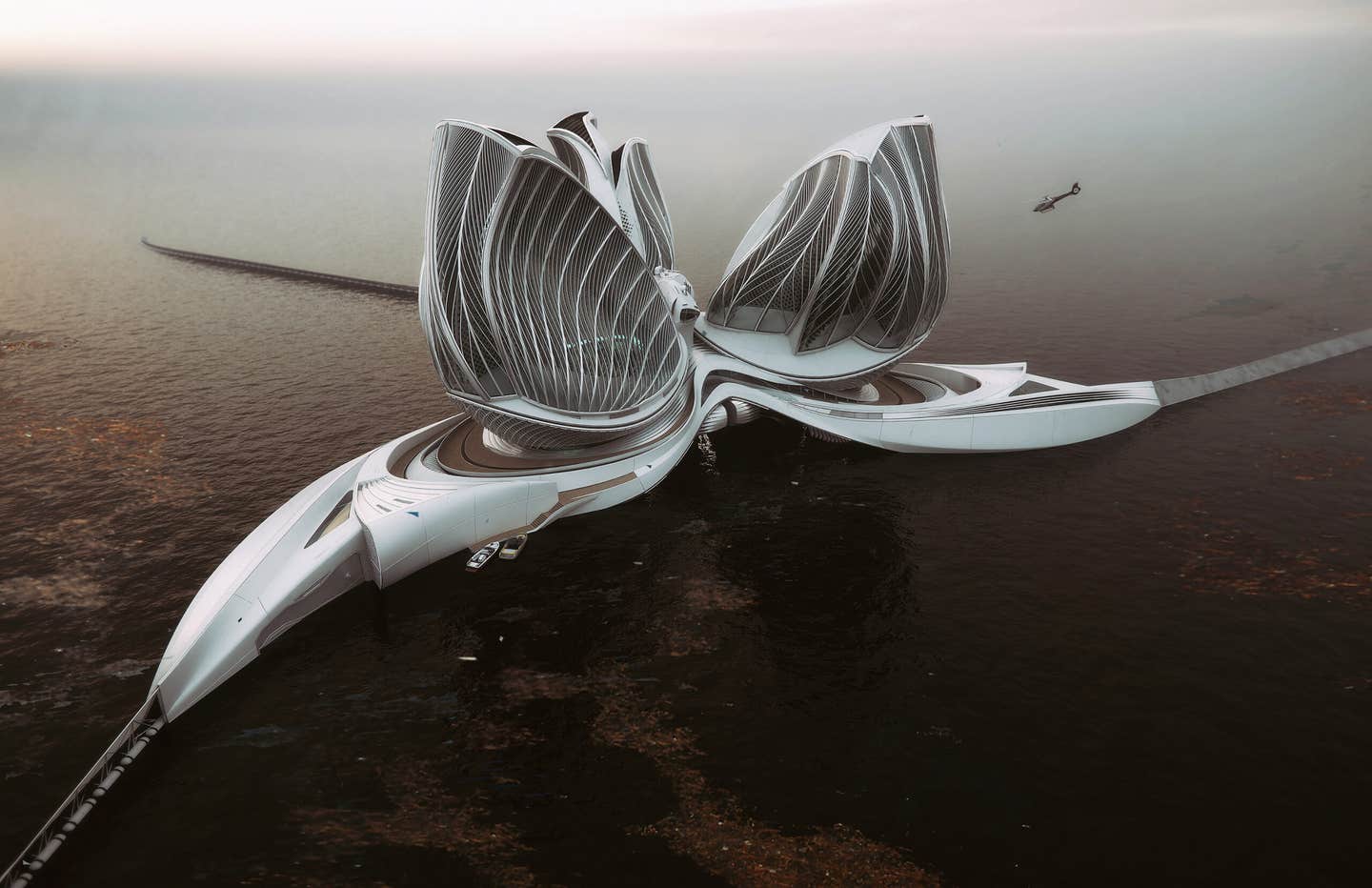Majestic ‘8th continent’ could recycle plastic collected from the ocean
Award-winning architect has harnessed innovative design to develop a solution that could change the course of global conservation efforts.

The spine of the facility will house the living and working quarters, where collected waste is sorted and recycled. (CREDIT: Lenka Petráková)
Fighting the destructive impact of humanity's pollution in the ocean, award-winning architect Lenka Petráková has harnessed innovative design to develop a solution that could change the course of global conservation efforts.
Petráková's concept, fittingly titled 'The 8th Continent', is an ambitious initiative aiming to effectively recycle ocean plastic, while simultaneously being a completely self-sustainable entity. This revolutionary architectural project might as well be the vanguard in the battle against the ceaseless inundation of plastic waste in our oceans.
A Grand Blueprint for a Cleaner Future
Conceived as a five-part structure, 'The 8th Continent' incorporates a vast array of facilities, ranging from greenhouses to living quarters and biodegradable waste collectors. It's a new-age ark, designed to survive and thrive amidst the plastic tide of the world's most massive bodies of water.
The architect's vision does not merely involve cleaning up the mess, but also to provide a restorative and regenerative solution to the damaged marine ecosystem.
Petráková, a senior designer at the illustrious Zaha Hadid Architects in London, brought forth the concept for 'The 8th Continent' as part of her master thesis during her student years in Vienna, Austria. It was there that she delved into the issue of ocean pollution, a subject that would ultimately shape her career.
Her journey into understanding the ecological catastrophe unfolding in the world's oceans was a profound one. "I realised how destroyed the oceans are and how many species are extinct, how much pollution is there, and that the parts that may have never seen a human being, feel the effects of our activities," she shares, voicing the tragedy that so many overlook.
Related Stories
From Theory to Award-Winning Design
Her journey to create this novel idea was not an overnight feat. As per data from the International Union for Conservation of Nature (IUCN), at least 8 million tonnes of plastic find their way into the sea annually. A substantial amount of this waste makes its way into our food and bodies, showcasing the catastrophic cycle of pollution.
Alarmingly, the havoc caused by plastic pollution is not confined to the human race alone. Every year, 100,000 marine mammals and turtles, and 1 million sea birds pay the price with their lives due to plastic pollution.
With this in mind, Petráková revisited and refined her initial ideas in 2020, with the final concept earning her the 2020 Grand Prix award for architecture and innovation of the sea. This accolade was conferred by the prestigious Foundation Jacques Rougerie, recognising her vision to transform the marine ecosystem.
Marine-Inspired, Self-Sustaining Living Organism
In designing 'The 8th Continent', Petráková sought inspiration from the marine life it would aim to protect. As she explains, "I was looking into marine species, animals as well as plants. And I was studying how they really interact with water environments, how they can harvest energy and how they work with nutritions, for example."
In other words, the '8th Continent' is a blueprint of a 'living organism' that mimics the symbiotic relationships found in marine ecosystems. But beyond being merely a self-sustaining entity, this floating station was designed to regenerate the ocean's health actively.
Once operational, 'The 8th Continent' could tether to the sea bed, while still maintaining the flexibility to move in line with the ocean's currents. It is projected to produce its own energy through harvesting facilities and be equipped with water desalination centres. Thus, the station not only survives but aids in revitalising the health of the surrounding ocean.
Looking to the Future
Petráková, ever forward-looking, has even identified potential patrons for her ambitious project. Tech magnate Elon Musk, known for his passion for cutting-edge technology and the exploration of new territories, could be the perfect benefactor for the '8th Continent'. "I believe Elon Musk would be a great patron of the project given his energy and excitement to push the technology forward and to research new territories," she optimistically shared in a recent interview.
While 'The 8th Continent' is still in its conceptual phase, its possibilities are virtually boundless, and the environmental implications are groundbreaking. This unprecedented architectural undertaking stands as a testament to human ingenuity and a promise for a cleaner, healthier planet.
Note: Materials provided above by The Brighter Side of News. Content may be edited for style and length.
Like these kind of feel good stories? Get The Brighter Side of News' newsletter.
Joseph Shavit
Head Science News Writer | Communicating Innovation & Discovery
Based in Los Angeles, Joseph Shavit is an accomplished science journalist, head science news writer and co-founder at The Brighter Side of News, where he translates cutting-edge discoveries into compelling stories for a broad audience. With a strong background spanning science, business, product management, media leadership, and entrepreneurship, Joseph brings a unique perspective to science communication. His expertise allows him to uncover the intersection of technological advancements and market potential, shedding light on how groundbreaking research evolves into transformative products and industries.
